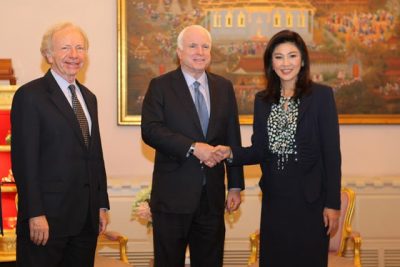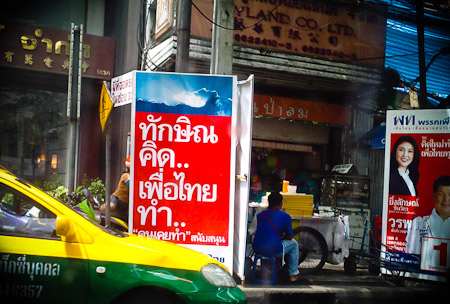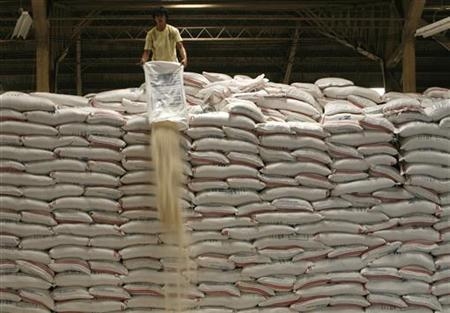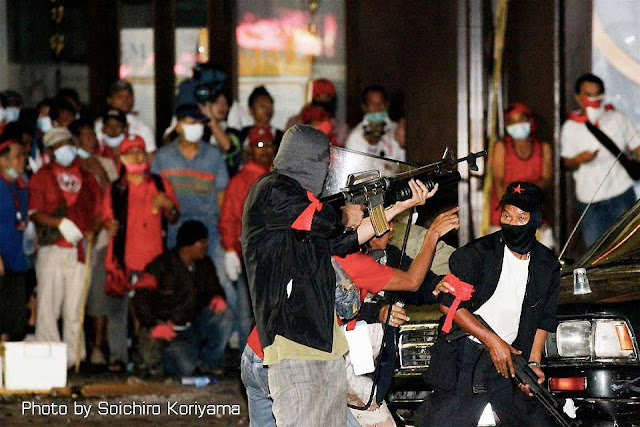Thailand: West Prepares Ground For Regime Change

Featured image: The “two horsemen of US regime change,” US Senator’s John McCain and Joseph Lieberman, appear and surround the US proxies of choice ahead of any US-backed attempt to destabilize and overthrow a sovereign nation. Here they lend support to Yingluck Shinawatra ahead of her anticipated ousting from power in 2014. Efforts are now underway to have her and the party she represents placed back into power. (Source: Land Destroyer Report)
Ahead of a pivotal court case in Thailand, US interests – both political and across the media – are preparing the grounds for the next round of foreign-backed destabilization.
Efforts to reinstall US proxies into power in Thailand is part of a larger effort to transform Southeast Asia into a united front against a rising China in an attempt to reassert American “primacy” over the region. US support for the Shinawatra family dates back to Thaksin Shinawatra‘s time as adviser to US-based equity firm, the Carlyle Group, and continues to present day.
Ousted Thai prime minister, Yingluck Shinawatra, faces charges of negligence regarding a vote-buying rice scheme in which above market prices were promised to farmers if they put her political party, Pheu Thai, into power during 2011 elections.
As a global leader in rice production and exports for decades, Thailand’s markets were immediately disrupted as funds quickly ran dry, quality plummeted, and regional competitors found favor with the nation’s traditional trading partners instead.
In 2014 when Shinawatra was finally ousted from power after months of street protests and a military coup, government warehouses were overflowing with unsold, mold-infested rice.
Billions were lost in the program, and the provisional military-led government that took power has since spent years repaying farmers and attempting to mend the nation’s agricultural industry.
It was a clear-cut case of a vote-buying scheme riddled with corruption and incompetence that ended with the nation’s rice farmers more dependent on political handouts and more vulnerable to the realities of national and global economics.
What the West is Saying: The Lies
Despite these facts, the West through its various lobbyists and the media outlets that host them, are attempting to frame this current political juncture in an entirely different light.
Opposition lobbyist and Shinawatra confidant, Pavin Chachavalpongpun, who poses and is presented by the Western media as an impartial “academic” based at Kyoto University’s Center for Southeast Asian Studies, recently posted a summary of the latest talking points being used by US and European special interests and their political proxies in Thailand.
The op-ed published by Reuters and republished by Japan Times titled, “Trial of Yingluck sparks deeper crisis for Thailand,” claims:
Yingluck won a landslide victory in the 2011 election, riding on her party’s populist platform inherited from the government of her brother, Thaksin, who had been in power from 2001 to 2006. Thaksin implemented policies designed to empower rural residents of the north and northeast regions. They subsequently served as strong power bases for Thaksin’s party. Yingluck initiated the rice-pledging scheme, which resulted in purchasing rice from farmers at above-market rates, distorting global prices. This proved highly popular among her supporters in the rural provinces.
He also claims:
Therefore, if the junta decides to get rid of her through legal means, street protests are a possibility and political violence might be inevitable. Imprisoning Yingluck would not be the end of the political game, however. Already her supporters are comparing her with Myanmar pro-democracy leader Aung San Suu Kyi, who had to live under house arrest for 14 years over a 20-year period. Suu Kyi’s incarceration earned her the title of a democratic icon and she became the symbol of struggle against Myanmar’s military rule.
While Pavin admits that the scheme distorted global prices, virtually everything else is an intentional, well-rehearsed lie.
His attempted comparison between Yingluck Shinawatra and Myanmar’s Aung San Suu Kyi is apt – however not in the way Pavin likely intended. Suu Kyi – like the Shinawatras – is a decades-long recipient of US and European political backing – her political party and the Western-funded fronts posing as nongovernmental organizations (NGOs) serve as an extension of foreign interests abroad.
Her “saintly” image has been carefully constructed through Western propaganda for years, so carefully that even the genocide she complicity presides over regarding Myanmar’s Rohingya minority has failed to tarnish her image in the eyes of many, including – apparently – Pavin.
What the West Isn’t Saying: The Truth
The 2011 Thai election was far from a “landslide.” In reality, only 35% of all eligible voters voted for Shinawatra’s Pheu Thai Party (PTP), and among Thais who voted, PTP failed to garner even a popular majority.
Pavin omits that during the 2011 election, Yingluck Shinawatra openly ran as a proxy for her brother, Thaksin Shinawatra, a convicted criminal who fled abroad evading a 2 year jail sentence for corruption. The PTP campaign slogan for 2011 was literally, “Thaksin Thinks, PTP Does,” openly admitting that a convicted criminal and fugitive was running PTP from a hotel room in Dubai, United Arab Emirates, not those in Thailand on the actual ballots people were casting.

A 2011 PTP campaign sign reads, “Thaksin Kit.. Pheu Thai Tom,” which when translated means, “Thaksin Thinks, Pheu Thai Does,” openly acknowledging that a convicted criminal and fugitive evading a 2 year jail sentence is running the opposition party in direct contradiction to the law. Because of Shinawatra’s immense wealth and foreign backing, he and his followers have enjoyed this sort of flagrant impunity for years.
Pavin also claims between 2001-2006, Thaksin Shinawatra’s policies “empowered rural residents.” In reality, they were unsustainable handouts provided in exchange for political support – the only real “empowerment” was of Shinawatra’s political machine in the nation’s rural northeast.
Pavin conveniently omits Shinawatra’s 2003 “war on drugs” in which nearly 3,000 innocent people were mass murdered in the streets over the course of 90 days. He also omits systematic abuses between 2001-2006, including abductions, intimidation, and assassinations of Shinawatra’s political opponents.

Vote-buying “populism” destroyed Thailand’s rice industry, including an international reputation it has built up over decades. Even as the country attempts to repair the damage, those responsible for it are attempting once again to claw their way back into power – with Western backing.
Pavin also omits throughout his lengthy op-ed the street mobs Shinawatra and his Western backers created after being ousted from power in 2006, the “United Front for Democracy Against Dictatorship” (UDD or “red shirts), who have – since 2006 until present – carried out attacks, murder, terrorism, and even wide-scale armed riots and insurrections.

In 2010, Thailand got a taste of US-backed “peaceful pro-democracy activists” – “red shirts” – who carried out Arab Spring-style violence in an attempt to trigger nationwide Libyan or Syrian-style conflict. Luckily for Thailand, these attempts failed.
This includes violence in 2010 that claimed nearly 100 lives and culminated in citywide arson in Bangkok, terrorism carried out against anti-Shinawatra protesters between 2013-2014 that left over 20 dead including women and children, and a bombing spree this year that included a hospital.
Pavin omits all of this, because if readers understood the actual context of Yingluck Shinawatra’s trial or the true nature of the “opposition” he is lobbying for, they would realize just how much Thailand’s current political order is attempting to compromise with the opposition – an opposition whose crimes if committed anywhere in the West would have been long ago labelled terrorism, prompting the opposition’s judicial – and if necessary – martial eradication.
Pavin envisions at the end of his op-ed a scenario that might lead to protests and even violence in the streets, similar to 2010. It is the same sort of scenario that US and European interests are trying to implement in Venezuela, and have already ignited and left to burn in Libya, Syria, and Yemen.
In addition to dishonest paid-placements in the media, the US Embassy and others are busy at work on the ground in Thailand – funding and directing fronts posing as NGOs, including Prachatai, Thai Lawyers for Human Rights (TLHR), Thai Netizen, the New Democracy Movement, and many more – posing as impartial rights advocates – but who are in fact working behind such advocacy to protect and propel a US-backed client regime back into power.
Similar efforts were underway across North Africa and the Middle East before the US-engineered “Arab Spring” was “sprung.” The same sort of concerted subversion and propaganda being spread in Thailand today, was quietly used in places like Syria before brutal warfare grabbed international headlines.
Seeing it unfolds now in Thailand means that potential headline-grabbing conflict later will take no analysts by surprise, and provide them with a clear picture of what really led up to any wider conflict that may erupt.
All images in this article are from the author.

